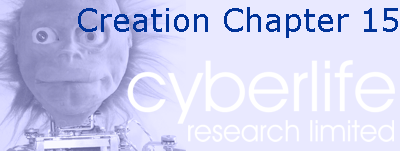
|
|
VapourwareBishop Berkeley destroyed this world in one volume octavo; and nothing remained, after his time, but mind; which experienced a similar fate from the hand of Mr Hume in 1739. Sydney Smith, Sketches of Moral Philosophy Deep down, perhaps what really frightens people about artificial life and AI is not so much the machines running amok, but what the very possibility of such things says about us, as human beings. If machines can be alive and have thoughts and goals of their own, then presumably we need be no more than machines ourselves, and people simply do not want to be told that they are nothing but clockwork. Yet I started out by asserting a paradox that life is more than just clockwork, even though it is nothing but clockwork. We have dealt fairly comprehensively with the latter idea: we examined the nature of the basic mechanical processes that underlie all persistent phenomena, and we looked in detail at how structures with at least a little personality, intelligence and autonomy can arise from them. Since we have now reached the last chapter, I think we can indulge ourselves in a little speculation about the first assertion as well – that life is more than just clockwork. So let me risk delving into the three things that we human beings hold most sacrosanct: our free will, our minds and our souls. |
Copyright © 2004 Cyberlife Research Ltd. |